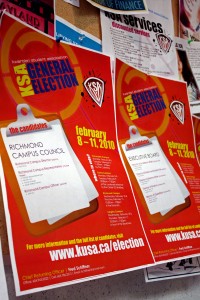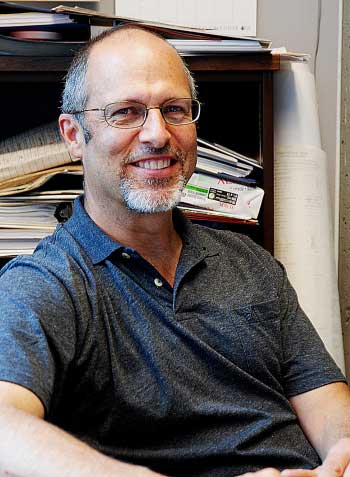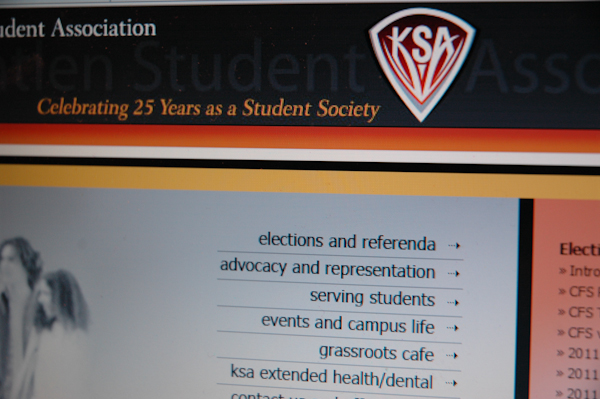2011 KSA elections first-ever online only vote
January 25, 2011 by Jeff Groat · Leave a Comment
When the polls close at noon on Feb. 6, this year’s KSA elections will be the first to have been conducted exclusively online.
Unlike previous elections, which occurred only on one day and involved physical ballot boxes and voting booths, voting will be conducted online from noon on Jan. 31 to noon on Feb. 6.
But there are concerns among KSA Executive Board members that the door for breaking the rules is wide open.
KSA Director of Academic Affairs, Brad Head, sees problems with the online voting system, predicting a lower voter turnout. “Many students don’t vote already… many students don’t go onto their myKwantlen account,” he said.
Head is also concerned about cheating.
Since voting traditionally took place at stationary voting booths in years past, computers that will now be used for voting are required to be “stationary.” In other words, candidates are barred from simply walking around campus with a laptop and asking people to vote.
KSA Director of Finance, Shanal Prasad, has similar concerns.
“There is so much potential for things to go wrong,” he said. “What if a group of people have a giant party and they have a laptop there and they get all their friends to come and vote?”
KSA Director of External Affairs, Matt Todd, said it’s also against the rules for a candidate to walk around and offer candy bars in exchange for votes, something that was just as likely under the paper-balloting system.
“We already live with that risk, we just have different packaging on the risk,” Todd said.
(The distribution of food and drink is a violation listed in KSA elections Regulations document on their website and candidates are held responsible for the actions of supporters. According to KSA regulations, “the candidate accepts full responsibility… that any offenses committed by campaigners shall be deemed to be offences committed by the candidate.”)
As for benefits, Todd said it is much cheaper to put the vote online. And because it is cheaper, it is possible to run the election over more days and, he hopes, capture more voters. As well, there are no “bad ballots” online, and tabulation of votes is automatic.
This year, there are 59 candidates running for various positions in the KSA. This is the largest number of candidates to have run in a single election at Kwantlen. “It means people are paying attention and actually care enough to participate,” Todd said.
Here is a full list of candidates (link is to a PDF.)
Elections are in the air
February 10, 2010 by Kyle Vinoly · Leave a Comment

Voting will be open tomorrow (Thursday) from 10 a.m. until 7 p.m. so students at the Richmond and Langley campuses can cast their ballots. (Kyle Vinoly photo)
Tomorrow (Thursday) will be the final day Kwantlen students can cast their vote in this year’s Kwantlen Student Association’s general election.
“Richmond is always really busy,” said Fran Schiffner, whose company oversees elections at the different Kwantlen campuses. “I think it’s because of where it is. It’s all in one building…I think there’s more exposure.”
Shiffner said this election has seen less of a voter turnout then in previous years.
“The last few [years] we’ve run out of ballots,” said Alice Rush, who works for Schiffner. “We need to get more people out to vote.”
Both women believe mid-terms and the Olympics may be distracting students from showing up.
Voting will be open until 7 p.m. tonight (Wednesday) and tomorrow, at Richmond and Langley campuses. Voting closed Tuesdays at Cloverdale and Surrey.

Fran Schiffner and Alice Rush are on hand to make sure every vote is cast fairly. (Kyle Vinoly photo)
Galled by apathy, instructor pushes voting
October 13, 2008 by Sandy Buemann · Leave a Comment

Paul Richard, chair of the environmental protection program, urged fellow instructors to get students involved in Tuesday
Paul Richard, the chair of the environmental protection program at Kwantlen, was appalled when he read that Kwantlen students weren’t planning to vote in Tuesday’s federal election, so he decided to do something about it.
Richard wrote an email to members of the Kwantlen faculty, urging them to encourage their students to vote.
“It really galled me,†he said of students’ responses when the Kwantlen Chronicle asked whether they were voting. Five of the eight students polled said they were not.
The students seemed to be saying “I’m ignorant and proud of it,†said Richard. He says the ignorance in North American society is dangerous. If it is culturally acceptable to dumb things down, the government could have a “large mass of people that are easy to manipulate.â€Â
Students need to learn not just the facts and the figures through their education, said Richard, but learn about their role in society as a whole. The excuses for not voting were not good enough and “it shows that something is wrong with all of us.†The first step is to engage students in discussion so they are “simply thinking about it,†said Richard.



